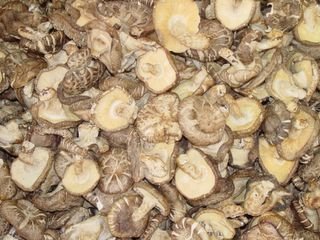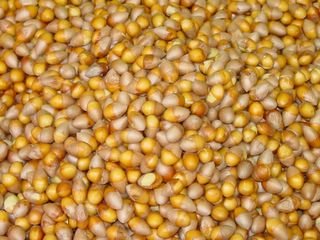The Genetically Modified Conundrum - Yahoo! News
By Alyce Lomax
The U.S. is sometimes described as the bastion of biotech crops, the great hope for the sparkling future of genetically modified (GM) foods. That's seen as a boon to some of the companies that have been spearheading efforts to develop such crops and distribute them throughout the food supply. Likewise for the biggest food providers, who hope to market and sell these wares throughout the world. Yet there's still the fact that GM foods remain controversial, to say the least.
Feeling hungry? The images below were taken at markets in China and Thailand. Can you identify the items? Click on the photo get get a larger (expanded) view. I'm putting images and many others are put into the public domain.
#1)

#2)

#3)

#4)

#5)

#6)

#7)

#8)

#9)

#10)

#11)

#12)

#13)

#14)

#15)

#16)

#17)

#18)

#19)

(To be honest, the worms are not to be eaten so much by people. This photo was taken on a street devoted to pets, aquariums and such. But, the butchers row is very near.)
#20)




1 comment:
full article:
The Genetically Modified Conundrum
By Alyce Lomax
The U.S. is sometimes described as the bastion of biotech crops, the great hope for the sparkling future of genetically modified (GM) foods. That's seen as a boon to some of the companies that have been spearheading efforts to develop such crops and distribute them throughout the food supply. Likewise for the biggest food providers, who hope to market and sell these wares throughout the world. Yet there's still the fact that GM foods remain controversial, to say the least.
There's a troubling element to Americans' supposedly open arms about GM foods: Many of them apparently simply don't know much about it. While some people have heard of efforts to genetically engineer crops, what many Americans may not realize is that those crops are already here. A survey from the Pew Initiative on Food and Biotechnology last fall said that 58% of Americans are unaware of GM foods; a mere 41% know that they are already available on grocer's shelves.
I can't help wondering whether some consumers will feel duped when they realize that the future is already here and nobody bothered to tell them. Whether GM foods will turn out to be dangerous to human health and/or the environment isn't exactly the point I want to make. What may be dangerous to some of the related entities is the seemingly clandestine way that GM foods have been introduced into Americans' pantries -- as if the makers of GM foods hope we won't notice.
Don't look, don't tell
I first started reading about the GM-foods controversy when I delved into what I believe are risks for Monsanto (NYSE: MON - News). There, I explored the idea that while Monsanto may have cleaned up and greened up its image, its foray into biotech food is riskier than some might want to believe.
Monsanto's not the only company that's making a big bet on GM foods. DuPont (NYSE: DD - News), Syngenta, and Bayer are also involved in this budding industry.
GM foods are bolstering the profits of companies like Monsanto, and there are some logical reasons why anti-GM advocates suspect a level of foul play. Critics like to point out that when regulators wrote the rules for GM foods, the Food and Drug Administration's deputy commissioner for policy, Michael Taylor, happened to be a former attorney for Monsanto. What's more, after his stint at the FDA, he went on to become a vice president at Monsanto. Critics claim there is plenty of such overlap between business and government agencies as corporate executives become regulators of their own industries. But although a regulator should have adequate expertise in his or her area, it doesn't take rocket science to suspect the possibility of grave conflicts of interest.
It's no surprise, then, that critics go on to claim that here in the U.S., the regulatory environment has been extremely lax when it comes to biotech foods. Critics say that too few rules and too little testing and oversight into GM crops amounts to a "don't look, don't tell" mentality -- meaning that corporate entities don't reveal any concerns that might crop up, and regulators don't look for them. (However, the U.S. Department of Agriculture's inspector general did recently criticize his own agency's treatment of GM field trials.)
GM proponents see the foods as a great hope for consumers, helping humanity combat hunger and disease through enhanced edibles that are engineered to be tougher, stronger, and better for you than the natural versions. So it's easy to see where the controversy lies as these ingredients travel through the food chain.
What's in my cereal?
If it sounds as though I'm on the critics' side, I must admit that I am leaning in that direction, because of claims that there hasn't been nearly enough testing -- or, in lieu of testing, time passed -- to know whether GM foods really are as harmless as believed. Meanwhile, even the suggestion of regulatory bias makes me uneasy as well.
At any rate, I'm not a scientist; I'm someone who's fascinated with business and investing, and a consumer, just like you. And at the moment, there are strong arguments in both the pro and con camps. My biggest issue with this whole controversy is simply that the foods containing GM ingredients are not being clearly labeled for the public.
I suppose many would say that since regulators here in the U.S. don't require labeling, the companies in question don't have to do it. However, there's a difference between legality and ethics. In that vein, why shouldn't the companies involved voluntarily label their products as containing GM ingredients? If these ingredients are indeed as safe as they say, then why not? Surely, they have nothing to hide.
Could this lack of transparency be part of the reason why companies like Whole Foods Market (Nasdaq: WFMI - News) are doing so well with their organic wares? (Certified organic is, by definition, GM-free.) Anti-GM consumers are surely attracted to stores like Whole Foods and Trader Joe's, where there's an emphasis on foods that haven't been monkeyed with. I've long believed that Whole Foods' ethics have been a clear element of its impressive sales growth and profitability.
Furthermore, if you're a label reader, you might have noticed that some companies use a lack of GM ingredients as a marketing pitch. That's smart business that could become even smarter as consumers increasingly realize that the companies that do include GM ingredients don't seem to be inclined to say so. Greenpeace has implicated such heavyweights as Kellogg (NYSE: K - News), Hershey (NYSE: HSY - News), Campbell (NYSE: CPB - News), and General Mills (NYSE: GIS - News) as among the many major food companies using GM ingredients. According to estimates, 75% of all processed foods in the U.S. contain a GM ingredient; when you consider that about 80% of soy crops and 40% of corn is now genetically modified, the statistic makes sense.
Freedom not to choose
If the U.S. has been portrayed as very pro-GM, Europe is the opposite extreme. The current skirmish between the World Trade Organization and the European Union regarding the E.U.'s historically hard-line approach to GM goods (it OKs products on a case-by-case basis and requires labeling and traceability) is even more interesting to watch considering that, unlike Americans, European consumers are extremely aware of GM foods -- and firmly against them.
Americans may be consuming the goods, but they haven't been given the opportunity to make a clear choice. True, if labeling were a good-faith initiative by affected corporations, perhaps it would come to pass that Americans would happily eat GM foods, and that's fine with me. However, without labeling, the choice is being made for them.
Many corporations stand a lot to gain, in terms of profits, from biotech crops and the food they produce. And in this country, which so greatly prides itself on freedom, that lack of choice and information strikes me as a slippery slope. Some of the best companies -- the ones that reward investors the most over the long term -- are the ones that invoke trust from their customers. In light of this issue, I'd say that the companies that haven't felt moved to voluntarily label still-controversial GM ingredients in their products aren't doing much to earn that trust.
Whole Foods Market is a Motley Fool Stock Advisor selection.
Alyce Lomax does not own shares of any of the companies mentioned. The Motley Fool has a disclosure policy.
Post a Comment